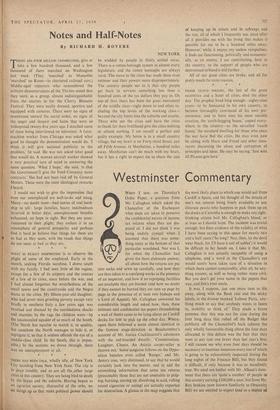Notes and Half-Notes
By RICHARD H. ROVER": rinHERE ARE FOUR MILLION UNEMPLOYED, give or I take a few hundred thousand, and a few thousand of them marched on Washington last week. (They 'marched' as Mussolini 'marched' on Rome—in chartered railroad cars.) Middle-aged reporters who remembered the militant demonstrations of the Thirties noted that they were, as a group, almost indistinguishable from the tourists in for the Cherry Blossom Festival. They were neatly dressed, sportive and equipped with cameras. There were no signs of resentment toward the social order, no signs of the anger and despair and hates that were so widespread twenty-five years ago. I watched some of them being interviewed on television. A farm- machine worker from Chicago was asked what good he thought the demonstration would do. 'I think it will give national publicity to the problem,' he said. He was not asked what good that would do. A woman aircraft worker showed a very practical turn of mind in answering the same question. 'What I hope,' she said, 'is that the Government'll give the Ford Company more contracts.' She had not been laid off by General Motors. These were the most ideological remarks I heard.
I would not wish to give the impression that even our unemployed are •well-to-do and smug. Many—no doubt most—had stories of real hard- ship to tell : large families, heavy indebtedness incurred in better days, unemployment benefits exhausted, no hope in sight. But they are unac- customed to their plight; they endure it in an atmosphere of general prosperity and perhaps find it hard yo believe that things for them are as bad as they seem, with the result that things do not seem as bad as they are.
WHAT IS REALLY DISPIRITING is to observe the plight of some of the employed. Early in the month, seeking Florida sunshine, I drove south with my family. I had seen little of the region, except for a few of its airports and the centres of a few of its cities, since before the war, and I had almost forgotten the wretchedness of the small towns and the countryside and the Negro slums in the cities. My fifteen-year-old daughter, who had never seen grinding poverty except very briefly in southern Italy a few years ago, was revolted and shamed by the tumbledown shacks and shanties, by the rags the children wore—by the unconcealed squalor of so much of the South. (The North has squalor to match it, in quality, but somehow the North manages to hide it, or segregate it, so that it seldom offends the eye of a middle-class child. In the South, this is impos- sible.) In the sections we drove through, there was no unemployment at all.
* * *
THERE HAS BEEN TALK, wholly idle, of New York City seceding from New York State. The city is in deep trouble, and so Are all the ,other large cities in this country. They are being bled to death by the States and the suburbs. Having begun as an agrarian society, distrustful of the urbs, we set things up so that more political power should NEW YORK be wielded by people in thinly settled areas. There is a rotten-borough system in almost every legislature, and the rotten boroughs are alWays rural. The move to the cities has made them even rottener and their powers more disproportionate. The country people see to it that city people get back in services something less than a hundred cents of the tax dollars they pay in. On • top of that, there has been the great movement of the middle class—right down to and often in- cluding the top levels of the working class— beyond the city limits into the suburbs and exurbs. Those who use the cities and have the cities to thank for their livelihood give the cities nothing or almost nothing. I am myself a perfect and guilty example. My home is in a small country village, but my heart is on Forty-third Street, just of Fifth Avenue, in Manhattan, a hundred miles away. Manhattan can't do much with my heart, but it has a right to expect me to share the cost of keeping up its streets and its subways and the rest, all of which 1 frequently use, since after all it provides me with the living that makes it possible for me to be a hundred miles away. However, while it enjoys my useless sympathies, it finds me functioning, politically and economic- ally, as an enemy. I am contributing, here in the country, to the support of people who are determined to bleed it still further.
All of our great cities are broke, and all for pretty much the same reasons.
FRANK LLOYD WRIGHT, the last of the great eccentrics and a hater of cities, died the other day. The prophet lived long enough—eighty-nine years—to be honoured in his own country, to become thoroughly convinced of his own pre- eminence, and to have seen his most notable creation, the 'earth-hugging house,' copied every- where in• the country—as the so-called 'ranch house,' the standard dwelling for those who since the war have fled the cities. He may even now be sitting with Marx and Freud and other inno- vators discussing the abuse and corruption of principles and ideas. He may be saying, 'Just wait till Picasso gets here.'


































 Previous page
Previous page